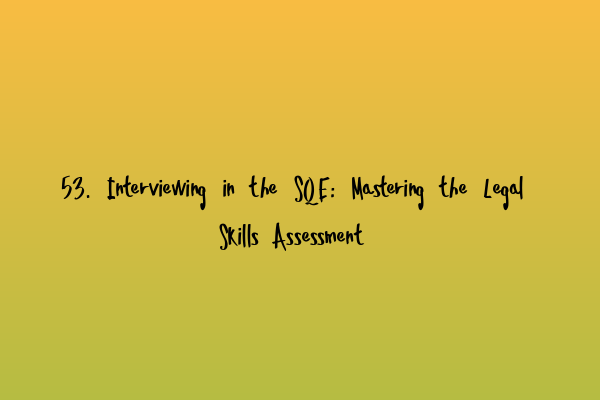53. Interviewing in the SQE: Mastering the Legal Skills Assessment
Welcome to SQE Exam Law! In this blog post, we will focus on an important aspect of the Solicitors Qualifying Examination (SQE) – the legal skills assessment. Specifically, we will delve into the topic of interviewing, an essential skill for any aspiring solicitor.
Interviewing is a fundamental skill that solicitors must possess in order to effectively communicate with clients, colleagues, and other professionals in the legal field. As such, it is a key component of the SQE, and mastering this skill is essential for success.
Why is Interviewing Important in the SQE?
The SQE comprises both written and practical assessments, and the legal skills assessment falls under the latter category. In this assessment, candidates are evaluated on their ability to interview clients, witnesses, and other relevant parties in a professional and effective manner.
Interviewing forms the basis for gathering information, building rapport, and advising clients. It is a critical aspect of legal practice, and being able to conduct interviews efficiently and effectively is crucial for providing high-quality legal services.
By evaluating candidates’ interviewing skills, the SQE aims to ensure that they have the necessary capabilities to excel as solicitors. This assessment allows candidates to demonstrate their ability to ask relevant questions, actively listen, analyze information, and build trust with clients.
Preparing for the Interviewing Skills Assessment
Like any other skill, mastering interviewing requires practice and preparation. Here are some strategies and tips to help you enhance your interviewing skills and excel in the SQE:
- Review the relevant legal principles: Familiarize yourself with the legal principles surrounding interviewing, such as the rules of evidence, client confidentiality, and ethical considerations. This knowledge will serve as a solid foundation for conducting effective interviews.
- Practice active listening: Active listening is key to understanding client needs and gathering relevant information. Focus on the speaker, maintain eye contact, and show genuine interest in their concerns. Through active listening, you can uncover crucial details that may impact the case strategy.
- Develop questioning techniques: Effective questioning techniques can help elicit essential information from clients and witnesses. Learn to ask open-ended questions that encourage detailed responses, as well as closed-ended questions for specific factual details. Use probing questions to explore further and clarify any ambiguous statements.
- Master the art of empathy: Empathy plays a critical role in building trust and rapport with clients. It involves understanding their emotions, showing compassion, and acknowledging their concerns. By empathizing with clients, you create a safe space for open communication and foster a stronger attorney-client relationship.
- Simulate interview scenarios: Practicing mock interviews will help you become more comfortable and confident in real-life situations. Consider working with a study group, engaging in role-play exercises, or seeking feedback from experienced solicitors. This hands-on approach will enhance your interviewing skills and allow you to refine your technique.
For more information on strategies and tactics to excel in the SQE, check out these related articles:
- SQE Strategies: Proven Tactics to Ace the Solicitors Qualifying Examination
- SQE Case Studies: Applying Knowledge in Real-Life Scenarios
- SQE Exam Strategy: Planning and Executing for Optimal Performance
- Solicitors Qualifying Examination (SQE): Your Gateway to Legal Practice
- Mastering Time Management in SQE: Strategies for Efficient Exam Completion
Conclusion
Interviewing skills play a vital role in the SQE and are essential for success as a solicitor. By mastering the art of interviewing, you can effectively gather information, build rapport with clients, and provide exceptional legal services. Remember to review relevant legal principles, practice active listening, develop effective questioning techniques, showcase empathy, and simulate interview scenarios to enhance your skills.
Stay tuned to SQE Exam Law for more insights and strategies to help you excel in the Solicitors Qualifying Examination!
